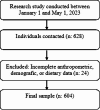The impact of carbohydrate quality index on menopausal symptoms and quality of life in postmenopausal women
- PMID: 40437473
- PMCID: PMC12117929
- DOI: 10.1186/s12905-025-03822-z
The impact of carbohydrate quality index on menopausal symptoms and quality of life in postmenopausal women
Abstract
Introduction: Menopause is a natural process that often leads to physical and emotional symptoms affecting women's quality of life. Nutrition is increasingly recognized as important in managing these symptoms, with certain dietary patterns-particularly those rich in fiber and whole grains-showing potential benefits. In many regions, including parts of Asia and countries with carbohydrate-heavy diets, carbohydrate quality may significantly influence menopausal health outcomes and related chronic conditions. This study aimed to examine the relationship between carbohydrate quality index, and menopausal symptoms and quality of life in postmenopausal women.
Methods: A total of 604 postmenopausal women participated. Participants completed a demographic questionnaire, the Menopause-Specific Quality of Life Questionnaire (MENQOL) (higher scores indicate poorer quality of life), and the Menopause Rating Scale (MRS) (higher scores indicate more severe symptoms). A food frequency questionnaire was used to collect dietary intake. Carbohydrate quality was assessed using the Carbohydrate Quality Index (CQI), which considers glycemic index, fiber intake, solid carbohydrate-to-total carbohydrate ratio, and whole grain consumption. Participants were divided into five quartiles based on their CQI scores. Statistical analysis was performed using SPSS 24, with Mann-Whitney U test, Kruskal-Wallis H test, ANOVA, and regression analysis controlling for socioeconomic status, body mass index, education, and menopausal status.
Results: Among the participating women, 273 were aged 30-55 years, 241 were aged 56-64 years, and 90 were aged 65 years and older. The youngest group (30-55) had the highest MENQOL (19.81 ± 9.70) and MRS (44.77 ± 30.91) scores, indicating more severe symptoms. Women postmenopausal for over 3 years reported significantly lower MENQOL scores (15.74 ± 0.42) compared to those postmenopausal for less than 3 years (17.98 ± 10.84) (Z=-1.95, p < 0.05). Across CQI quartiles, women in Q5 had significantly lowest MENQOL (14.35 ± 8.77) scores (Kruskal-Wallis χ²=2.24, p < 0.05). In regression analysis, being married (β = 0.13, p < 0.05) and receiving menopausal treatment (β = 0.11, p < 0.05) were positively associated with higher CQI scores.
Conclusions: Higher carbohydrate quality, is linked to fewer menopausal symptoms. Regression analysis showed that marital status and menopausal treatment were significantly associated with Carbohydrate Quality Index scores. Further research with larger samples and longitudinal studies is needed to explore the causal relationship between carbohydrate quality and menopausal outcomes.
Keywords: Carbohydrate quality; Carbohydrate quality index; Menopausal symptoms; Menopause-Specific quality of life.
© 2025. The Author(s).
Conflict of interest statement
Declarations. Ethics approval and consent to participate: The study was conducted following the principles of the Declaration of Helsinki and received ethical approval from the Ankara Yıldırım Beyazıt University Health Sciences Ethics Committee (approval date: December 08, 2022; decision number: 19-1237). All participants were informed about the purpose and procedures of the study, and written informed consent was obtained from each participant prior to data collection. Consent for publication: Not applicable. Competing interests: The authors declare no competing interests. ClinicalTrials.gov ID: NCT06666244-10/29/2024.
References
-
- Darıcı Koşan MK, Cangöl E. Menopoz Dönemindeki Kadınların Yaşadıkları semptomlar ve Baş Etme yöntemleri. STED. 2023;32(3):156–68. 10.17942/sted.1106278.
-
- Galfo M, Maccati F, Melini F. Lifestyle behaviours and dietary habits in an Italian sample of premenopausal and postmenopausal women. Int J Health Sci Res. 2022;12:1–10. 10.52403/ijhsr.20220301.
-
- Liu Z, Ho SC, Xie YJ, Woo J. Whole plant foods intake is associated with fewer menopausal symptoms in Chinese postmenopausal women with prehypertension or untreated hypertension. Menopause. 2015;22(5):496–504. 10.1097/GME.0000000000000349. - PubMed
MeSH terms
Substances
LinkOut - more resources
Full Text Sources
Medical


